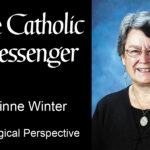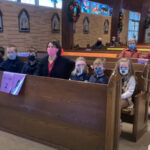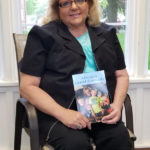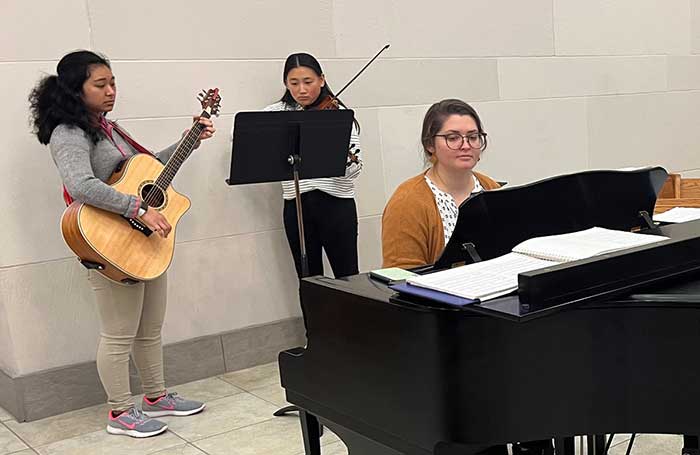
Maria Frommelt, on violin, leads music worship with Danielle Juco (guitar) and Lauren Bollweg, then-coordinator of music, justice and media ministry, during Mass at St. Ambrose University in Davenport last year.
By Barb Arland-Fye
The Catholic Messenger
What does it mean to feel welcomed, to have a sense of belonging in our parishes and schools? That question is under exploration this year throughout the Diocese of Davenport. It is the first leg of a three-year journey to “reflect together on how the Holy Spirit is calling us to be better missionary disciples in our living, celebrating, teaching and sharing the Good News of Jesus Christ,” Bishop Thomas Zinkula said.
He shared that message in his Epiphany 2023 letter, noting that parish councils and school boards had prioritized three themes among the 11 that emerged from more than 470 Synod listening sessions across the diocese. The three themes are welcoming and belonging, youth and family engagement, and Church teaching and tradition.
Each theme, one per year, will be the focus of efforts in parishes, schools and other diocesan entities. Welcoming and belonging is the first theme, launching in June. “By making our communities more welcoming, we will engender a greater sense of belonging. When people feel like they belong, they will be more open to efforts to better engage and support youth and family (second year) and to give greater attention to our teaching and tradition (third year),” the bishop said.
Participants in listening sessions throughout the diocese made clear the need for a greater sense of welcoming and belonging. Asked what fills their hearts and breaks their hearts about their experience of the Catholic Church, 46% of the participants said welcoming/sense of belonging filled their hearts while 54% said a lack of welcoming/belonging breaks their hearts.
In the five months leading up to a Synodal Summit on June 17 at St. Ambrose University in Davenport, parishes and schools will choose a couple/few representatives each to serve as leaders helping to discern and implement an action plan to address welcoming and belonging in parishes and schools.
The diocesan synodal process is an outgrowth of participation in Synod 2021-2024, now in the continental stage, which has adopted the theme “Enlarge the space of your tent” (Isaiah 54:2). “Enlarging the space in your tent requires everyone already in the tent to move closer together,” said diocesan Evangelization Director Patrick Schmadeke. People need to know that they belong, that they matter and that they are loved. “So often in the Church we operate from the mindset that we have something to give to others, without recognizing that they have something to contribute to us,” he added.
“I found my place”
Maria Frommelt, a junior at St. Ambrose University majoring in elementary education, describes what welcoming and belonging looks like for her. As a freshman, “I think there was some doubt as to whether I belonged within campus ministry and to what extent. Soon after arriving to campus, I quickly found my place in campus ministry, but more specifically, in music ministry. I had no intention of continuing the violin once I left high school but that quickly changed when I met Lauren Bollweg, the music minister at the time. I thought that I would just try playing my violin at Mass and seeing whether I liked it. Lauren warmly welcomed me and soon I was playing at every Mass on campus.”
“My relationship with Lauren and the other members of music ministry quickly grew and I knew that I found my place. Today, I am continuing to play violin at Masses with our current music minister, Colin Evers. Our campus ministry provides so many great opportunities for students to thrive and explore new things. I will forever be grateful for the community and sense of belonging that music ministry has provided me.”
“I see this place as a mission”
When Shari Bozorgzad became Head of School at Keokuk Catholic Schools-St. Vincent’s School (a K-5 elementary), she was struggling with a loss of students and a shortage of teachers in the
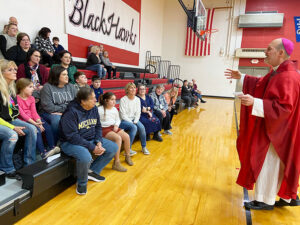
Bishop Thomas Zinkula gives his homily to students and their family members during a Mass at St. Vincent School in Keokuk last year.
midst of a pandemic. As an alumna, she wasn’t about to let the school close on her watch and now enrollment is growing. Students and their parents are invited to participate together in prayer at the start of the school day. Parents are welcome to attend assemblies, which students in different grade levels lead on a rotating basis. She arranged for students to take a tour of their own town, with the assistance of the Keokuk Area Chamber of Commerce. Afterwards, students built a replica of Keokuk in their school.
The student population is 51% Catholic and 49% non-Catholic. “I see this place as a mission,” Bozorgzad said. “This is an opportunity for us, for the Church, to profess our faith and to let people know this is what we believe.” Colleen Gredell, another alumna and member of Church of All Saints in Keokuk, works with the school’s altar servers and plans liturgical celebrations.
Last year, St. Vincent fifth-graders participated in a listening session for the diocesan Synod. Some of th 10 fifth-graders were not Catholic, so Bozorgzad adapted the questions to make the experience relatable. The students’ responses heartened her. “They know that their teachers care for them, they love having Mass at school,” she said, explaining that some of the students don’t have the opportunity to attend church services on Sunday. They noted their preference for contemporary music at Mass.
The hard work ahead
In this era of deep divisiveness and loneliness, honesty, trustworthiness and a willingness to set aside political and ideological barriers are essential to fostering welcoming and belonging, Schmadeke says. He quoted the author C.S. Lewis: “Next to the Blessed Sacrament, your neighbor is the most sacred object presented to your senses.” Schmadeke adds, “What would happen if we let that reality marinate in our hearts? Would it change how we relate to one another?”









